Key takeaways:
- Historical newspapers reveal not just events, but also emotions and cultural sentiments of the past, connecting modern readers to their ancestors.
- Accessing historical newspapers can be done through local libraries, online databases, and subscription services, each offering unique resources for research.
- Utilizing digital tools like OCR technology and organizing research through spreadsheets can enhance the efficiency of uncovering historical narratives.
- Patience and embracing unexpected discoveries can lead to valuable insights, transforming our understanding of family history through serendipitous finds.
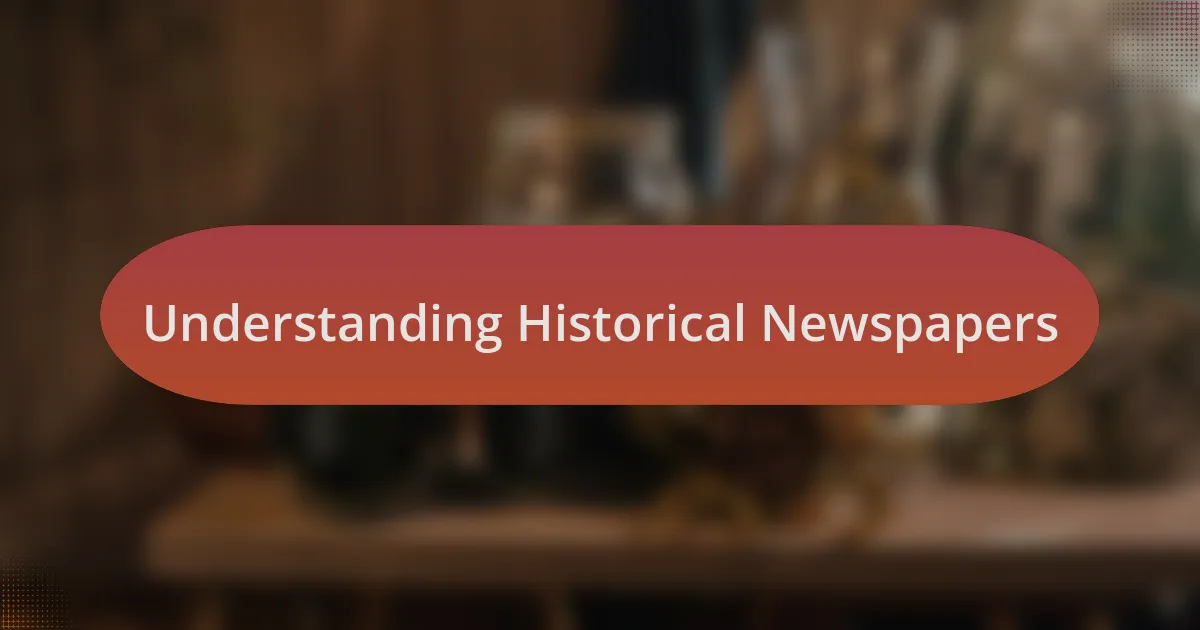
Understanding Historical Newspapers
Understanding historical newspapers is like opening a time capsule; they reveal the social fabric of the past. I remember the first time I stumbled upon an old newspaper in a dusty library. The headlines, filled with dramatic flair, transported me to a different era, and I couldn’t help but wonder about the lives behind those printed words.
These documents do more than report events; they capture the sentiments and opinions of the time, reflecting community norms and cultural shifts. I recall analyzing an article from the 1920s that covered women’s suffrage. The passionate language evoked a powerful sense of urgency and hope, making me realize just how significant these stories are in shaping our understanding of history.
When we engage with these newspapers, we not only uncover facts but also emotions, biases, and the everyday struggles of people long gone. Have you ever found a piece that resonated with your own experiences? It’s intriguing how these fragments of the past can connect us to our ancestors, making their stories feel alive in our present.
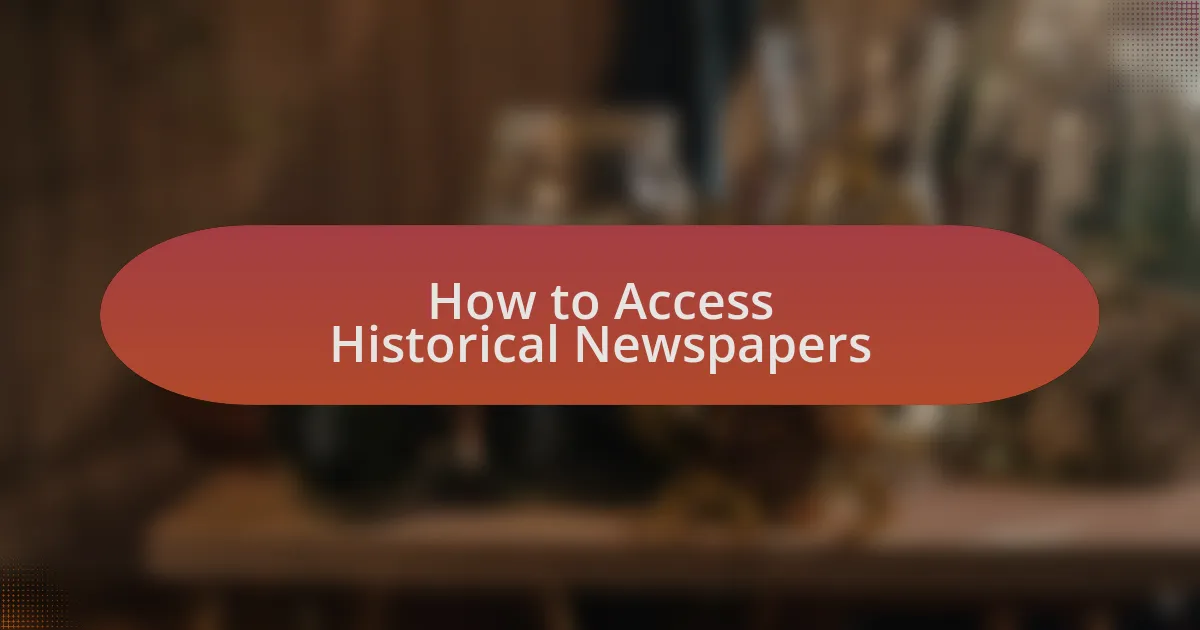
How to Access Historical Newspapers
Accessing historical newspapers can be a rewarding adventure. From my experience, local libraries are treasure troves. They often have archives of old newspapers in various formats, including microfilm and digitized collections. I remember asking a librarian for help and her enthusiasm was infectious. She pointed me to a wealth of resources I hadn’t even considered.
Online databases are another invaluable tool. Websites like Newspapers.com, Chronicling America, and even Google News Archive have vast collections that offer searchable access to historical publications. The first time I navigated through an online archive, I felt like a detective unraveling clues from the past. Have you tried searching for articles related to your ancestors? It’s amazing how a simple query can lead to uncovering familial stories that reshape your understanding of your lineage.
Finally, don’t overlook the importance of subscription services. Although they may come with a fee, they often provide access to a broader range of materials and more in-depth search functionalities. I recall weighing the cost and benefit before signing up, but once I found articles that connected to my family history, it felt like an investment well made. The stories I unearthed were priceless, breathing life into the names I only knew from family trees.

Tools for Researching Newspapers
Many digital tools enhance the research experience when investigating historical newspapers. One particularly helpful resource is the use of OCR (Optical Character Recognition) technology, which transforms scanned images of text into searchable data. I remember my first time encountering a newspaper article that was challenging to read due to poor quality. With OCR technology, the text became accessible, allowing me to dive into the content without the frustration of deciphering faded print.
In addition to digital tools, I’ve found that organizing your research with spreadsheets or databases can be incredibly effective. By cataloging the articles I found, I created a structured overview of my family’s history that was easy to navigate. Have you considered how a simple spreadsheet could keep your findings organized? Trust me, it can save you a lot of time when you’re on the hunt for that elusive article that ties it all together.
Lastly, don’t underestimate the power of community resources. Online forums and genealogy groups can be gold mines for tips and experiences from fellow researchers. I once posted a question about finding a specific newspaper edition, and the response was overwhelmingly supportive. Someone shared a different database I hadn’t heard of, which led me to a remarkable discovery about an ancestor’s life that I would have otherwise missed. Engaging with others not only brings fresh perspectives but also can inspire your journey in unexpected ways.
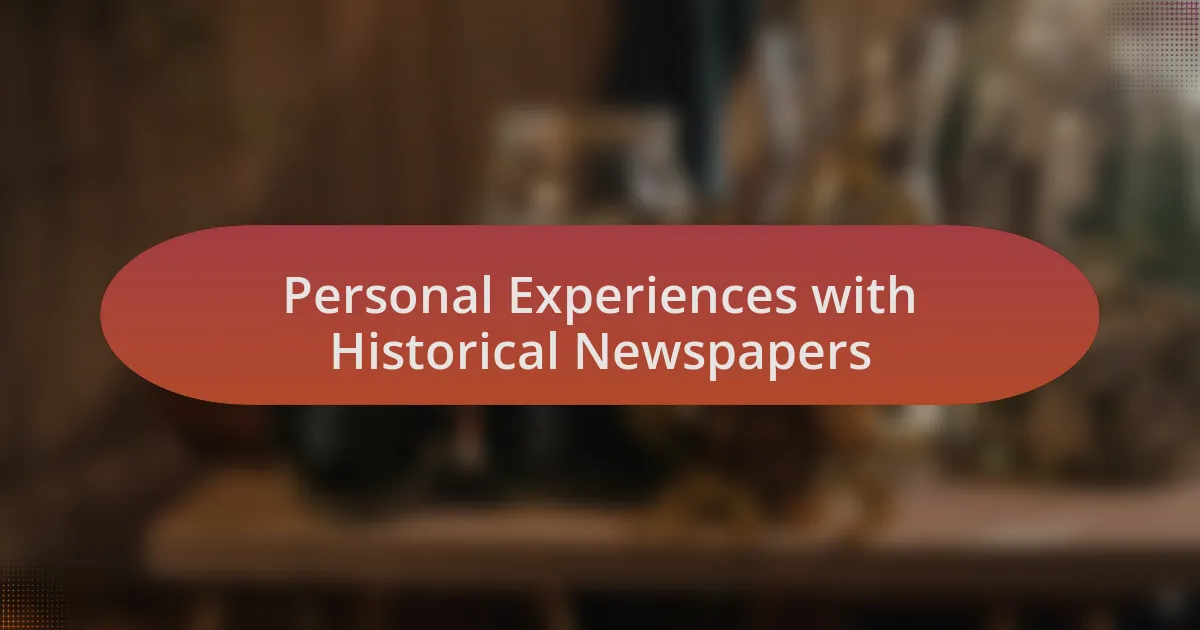
Personal Experiences with Historical Newspapers
As I sifted through stacks of digitized newspaper pages, a sense of nostalgia washed over me. There, nestled among the articles, was an old clipping about my great-grandfather’s business opening. It was like uncovering a time capsule that gave life to his stories I’d heard but never fully understood. When you see their names in print, doesn’t it make the history feel more tangible?
One moment that stands out was the discovery of a heartfelt letter to the editor written by my grandmother during World War II. Reading her words not only connected me to her struggles and hopes but also ignited a fierce pride in my heritage. Have you ever stumbled upon a piece of writing that felt like a direct line to your ancestors? It’s moments like these that remind me of the power historical newspapers hold in revealing our family’s narrative.
Researching historical newspapers has often felt like piecing together a puzzle, each article I discovered offering insights into the lives of my ancestors. I can recall the thrill of unearthing an announcement of my great-uncle’s award at a local fair, which painted a picture of his character beyond what family tales could convey. It’s fascinating how these snippets of daily life can transform our understanding of who our relatives were, don’t you think?
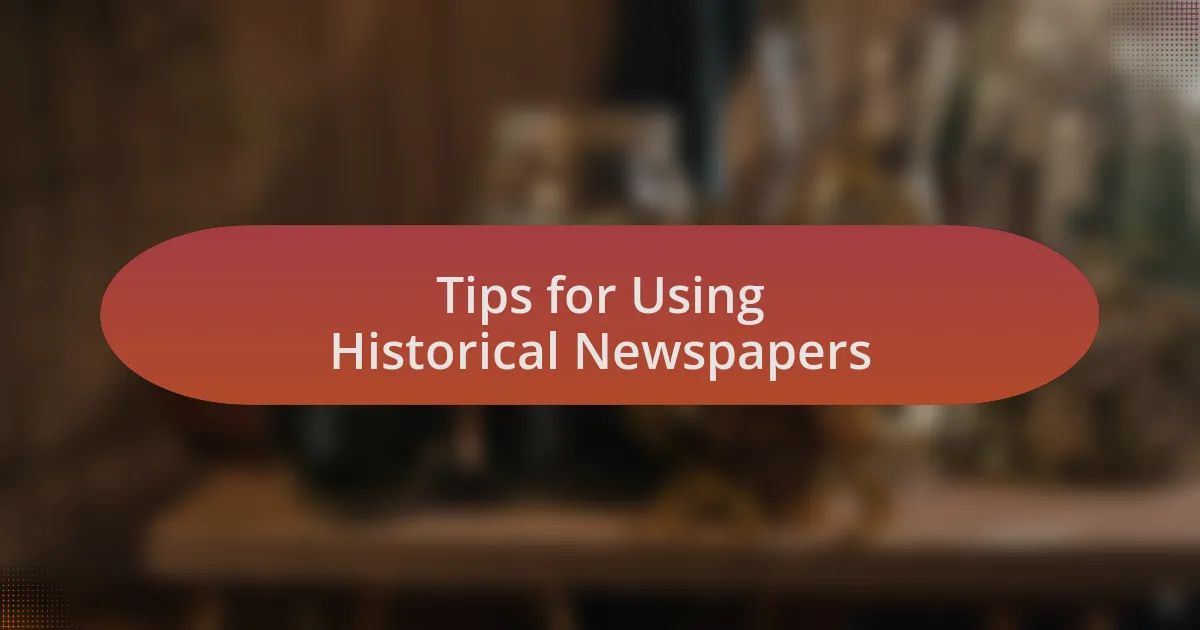
Tips for Using Historical Newspapers
When diving into historical newspapers, I recommend starting with specific names or events that intrigue you. For instance, when I searched for my great-grandmother’s name, I stumbled upon a fascinating article about the town’s centennial celebration. This led me down a rabbit hole of local happenings that shaped my family’s narrative. Have you tried zeroing in on a key figure in your lineage? It can yield surprising results.
Scanning for keywords is another effective strategy. I once used terms like “war” and “homecoming” when exploring my family’s military past, which rewarded me with emotional articles celebrating veterans’ returns. It felt like I was uncovering not just stories but the very fabric of their lives. What keywords resonate with your family’s history?
Finally, don’t forget to take notes as you go along. When I encountered an interesting article about my ancestor’s profession, jotting down my findings and thoughts helped create a personal record of the journey. Each note became a building block for understanding my roots, and I often refer back to them. Have you started your own collection of insights from your discoveries? It’s a practice that truly enriches the experience.
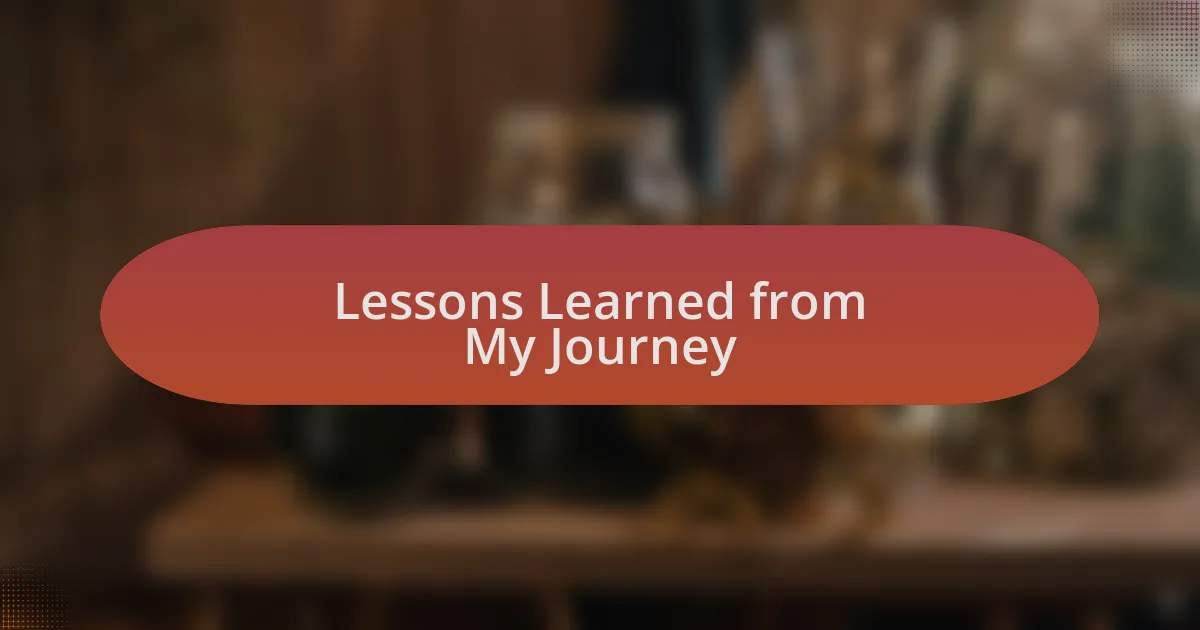
Lessons Learned from My Journey
One of the most valuable lessons I learned is the importance of patience. While sifting through pages and pages of newsprint, I often found myself frustrated when the information didn’t surface quickly. But then, I discovered an article that unveiled a long-lost family connection, rewarding my persistence. Have you ever felt like giving up only to find the treasure right around the corner?
I also realized how crucial it is to step outside my comfort zone. As I delved into articles that didn’t directly relate to my research, I stumbled upon unexpected stories that revealed the broader context of my ancestors’ lives. For instance, I uncovered a community’s struggles during an economic downturn that impacted my family in ways I hadn’t considered before. How often do we overlook the bigger picture in our searches?
Moreover, embracing serendipity can lead to remarkable discoveries. One day, while browsing an old newspaper archive, I accidentally clicked on a section I typically ignored—local sports. To my amazement, I found my grandfather’s name mentioned in a small write-up about a local championship. This “happy accident” opened my eyes to a side of him I knew little about. Isn’t it fascinating how seemingly random moments can reshape our understanding of family history?